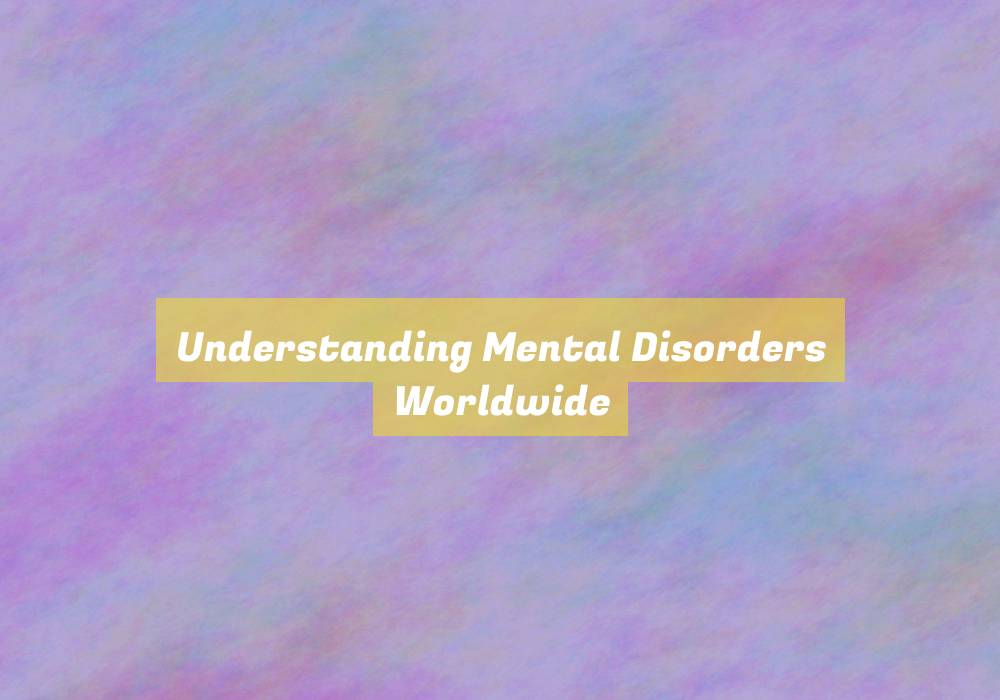Understanding Mental Disorders Worldwide
As you navigate the complex landscape of mental health around the world, it becomes apparent that understanding mental disorders goes beyond individual experiences. The global prevalence of these disorders is staggering, and the factors contributing to them are multifaceted.
However, the impact of mental disorders extends far beyond the individual, affecting society at large. In this discussion, we will explore the interconnected nature of mental health, the societal implications, and potential strategies for improving mental health awareness on a global scale.
This exploration may provide insight into the challenges and opportunities for addressing mental disorders worldwide.
Global Prevalence of Mental Disorders
Understanding the global prevalence of mental disorders is essential for addressing the challenges they present worldwide. Mental disorders affect millions of people globally, cutting across geographical, cultural, and socio-economic boundaries. The World Health Organization (WHO) estimates that around 450 million people suffer from mental or behavioral disorders. This accounts for 10-20% of children and adolescents worldwide experiencing mental disorders.
Furthermore, depression, anxiety, and substance abuse are prevalent in nearly every country, impacting people of all ages and backgrounds.
ItG??s crucial to recognize that mental health issues arenG??t isolated to specific regions or demographics. TheyG??ve a profound impact on individuals, families, and communities, influencing various aspects of life including education, employment, and relationships.
Acknowledging the widespread nature of mental disorders is the first step in implementing effective strategies for prevention, intervention, and treatment. By understanding the global prevalence of mental disorders, it becomes evident that these conditions demand a comprehensive and coordinated response from governments, healthcare systems, and society as a whole.
This awareness is fundamental in addressing the complex challenges associated with mental health on a worldwide scale.
Factors Contributing to Mental Disorders
Several key factors contribute to the development of mental disorders, impacting individuals across diverse backgrounds and circumstances.
One significant factor is genetics. Research indicates that certain genes may increase the likelihood of developing a mental disorder.
Additionally, environmental factors play a crucial role. Traumatic experiences, such as abuse, neglect, or the loss of a loved one, can significantly increase the risk of developing a mental disorder.
Moreover, brain chemistry and structure also contribute to mental health. Imbalances in neurotransmitters or alterations in brain structure can lead to various mental disorders.
Furthermore, substance abuse can exacerbate or trigger mental health conditions. The use of drugs and alcohol can have a detrimental impact on mental well-being.
Socioeconomic factors canG??t be overlooked either. Individuals facing poverty, unemployment, or housing instability may experience higher levels of stress, contributing to the development of mental disorders.
Lastly, social support and access to mental health resources are crucial in preventing and managing mental disorders. Lack of support and resources can exacerbate existing conditions or make individuals more susceptible to developing mental health issues.
Impact of Mental Disorders on Society
Mental disorders have a significant impact on society, affecting individuals, families, and communities in various ways.
Individuals suffering from mental disorders often face challenges in maintaining employment, leading to financial strain. This not only affects the individual but also impacts the economy as a whole.
Families of individuals with mental disorders experience emotional, financial, and social burdens as they navigate the complexities of supporting their loved ones. The stigma surrounding mental illness also has a profound effect on communities, leading to discrimination and exclusion.
Furthermore, mental disorders can strain healthcare systems and social services, diverting resources from other areas of need. This can lead to increased healthcare costs and reduced access to care for individuals with mental health conditions.
Additionally, untreated mental disorders can contribute to higher rates of homelessness and incarceration, further burdening society.
Addressing the impact of mental disorders on society requires a comprehensive approach that includes destigmatization, improved access to mental healthcare, and support for families and communities affected by these conditions.
Strategies for Improving Mental Health Awareness
Improving mental health awareness involves promoting education and understanding about various mental health conditions and their impact on individuals and communities. One effective strategy is to integrate mental health education into school curriculums. By teaching students about mental health from an early age, we can help reduce stigma and encourage open conversations about mental well-being.
Another important approach is to increase public awareness through targeted campaigns and events. These initiatives can provide accurate information about mental health, share personal stories of resilience, and offer resources for seeking help.
Additionally, training healthcare professionals and community leaders to recognize and support individuals with mental health challenges is crucial. By equipping them with the knowledge and skills to provide appropriate support, we can ensure that those in need receive timely and compassionate care.
Furthermore, leveraging digital platforms and social media to disseminate mental health resources and information can reach a wider audience and engage communities in discussions about mental well-being.
Conclusion
So, now you understand the global prevalence of mental disorders, the factors contributing to them, and their impact on society.
ItG??s clear that improving mental health awareness is crucial for addressing this issue.
By implementing strategies to enhance understanding and support for those with mental disorders, we can work towards creating a more inclusive and compassionate society for everyone.



